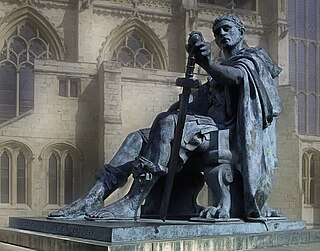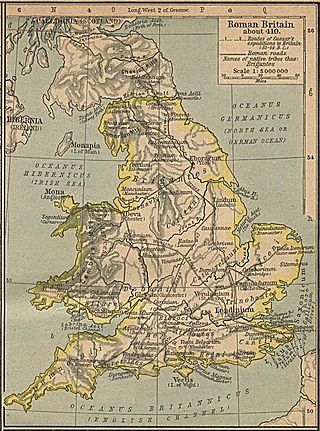Related Research Articles

Roman Britain was the period in classical antiquity when large parts of the island of Great Britain were under occupation by the Roman Empire. The occupation lasted from AD 43 to AD 410. During that time, the territory conquered was raised to the status of a Roman province.
Pope Zosimus was the bishop of Rome from 18 March 417 to his death on 26 December 418. He was born in Mesoraca, Calabria. Zosimus took a decided part in the protracted dispute in Gaul as to the jurisdiction of the See of Arles over that of Vienne, giving energetic decisions in favour of the former, but without settling the controversy. His fractious temper coloured all the controversies in which he took part, in Gaul, Africa and Italy, including Rome, where at his death the clergy were very much divided.

Pope Eleutherius, also known as Eleutherus, was the bishop of Rome from c. 174 to his death. His pontificate is alternatively dated to 171-185 or 177-193. He is venerated as a saint in the Catholic Church.

In church governance, a diocese or bishopric is the ecclesiastical district under the jurisdiction of a bishop.
Presbyter is an honorific title for Christian clergy. The word derives from the Greek presbyteros, which means elder or senior, although many in the Christian antiquity would understand presbyteros to refer to the bishop functioning as overseer. The word Presbyter is also mentioned in the New Testament.

Donatism was a Christian sect leading to a schism in the Church, in the region of the Church of Carthage, from the fourth to the sixth centuries. Donatists argued that Christian clergy must be faultless for their ministry to be effective and their prayers and sacraments to be valid. Donatism had its roots in the long-established Christian community of the Roman province Africa Proconsularis, in the persecutions of Christians under Diocletian. Named after the Berber Christian bishop Donatus Magnus, Donatism flourished during the fourth and fifth centuries.
Palladius was the first bishop of the Christians of Ireland, preceding Saint Patrick. It is possible that some elements of their life stories were later conflated in Irish tradition. Palladius was a deacon and member of one of the prominent families in Gaul. Pope Celestine I consecrated him a bishop and sent him to Ireland "to the Scotti believing in Christ".

Lucius was a supposed 2nd-century king of the Britons traditionally credited with introducing Christianity into Britain. Lucius is first mentioned in a 6th-century version of the Liber Pontificalis, which says that he sent a letter to Pope Eleutherius asking to be made a Christian. The story became widespread after it was repeated in the 8th century by Bede, who added the detail that after Eleutherius granted Lucius' request, the Britons followed their king in conversion and maintained the Christian faith until the Diocletianic Persecution of 303. Later writers expanded the story, giving accounts of missionary activity under Lucius and attributing to him the foundation of certain churches.

Eboracum was a fort and later a city in the Roman province of Britannia. In its prime it was the largest town in northern Britain and a provincial capital. The site remained occupied after the decline of the Western Roman Empire and ultimately developed into the present-day city York, occupying the same site in North Yorkshire, England.

Britannia Prima or Britannia I was one of the provinces of the Diocese of "the Britains" created during the Diocletian Reforms at the end of the 3rd century. It was probably created after the defeat of the usurper Allectus by Constantius Chlorus in AD 296 and was mentioned in the c. 312 Verona List of the Roman provinces. Its position and capital remain uncertain, although it was probably located closer to Rome than Britannia II. At present, most scholars place Britannia I in Wales, Cornwall, and the lands connecting them. On the basis of a recovered inscription, its capital is now usually placed at Corinium of the Dobunni (Cirencester) but some emendations of the list of bishops attending the 315 Council of Arles would place a provincial capital in Isca (Caerleon) or Deva (Chester), which were known legionary bases.

Britannia Secunda or Britannia II was one of the provinces of the Diocese of "the Britains" created during the Diocletian Reforms at the end of the 3rd century. It was probably created after the defeat of the usurper Allectus by Constantius Chlorus in AD 296 and was mentioned in the c. 312 Verona List of the Roman provinces. Its position and capital remain uncertain, although it probably lay further from Rome than Britannia I. At present, most scholars place Britannia II in Yorkshire and northern England. If so, its capital would have been Eboracum (York).

Caesarius of Arles, sometimes called "of Chalon" from his birthplace Chalon-sur-Saône, was the foremost ecclesiastic of his generation in Merovingian Gaul. Caesarius is considered to be of the last generation of church leaders of Gaul who worked to promote large-scale ascetic elements into the Western Christian tradition. William E. Klingshirn's study of Caesarius depicts Caesarius as having the reputation of a "popular preacher of great fervour and enduring influence". Among those who exercised the greatest influence on Caesarius were Augustine of Hippo, Julianus Pomerius, and John Cassian.

Flavia Caesariensis, sometimes known as Britannia Flavia, was one of the provinces of the Diocese of "the Britains" created during the Diocletian Reforms at the end of the 3rd century. It was probably created after the defeat of the usurper Allectus by Constantius Chlorus in AD 296 and was mentioned in the c. 312 Verona List of the Roman provinces. It seems to have been named after Chlorus's family and was probably located beside Maxima Caesariensis, but their positions and capitals remain uncertain. At present, most scholars place Flavia Caesariensis in the southern Pennines, possibly reaching the Irish Sea and including the lands of the Iceni. Its capital is sometimes placed at Lindum Colonia (Lincoln).
Arles in the south of Roman Gaul hosted several councils or synods referred to as Concilium Arelatense in the history of the early Christian church.
Restitutus was a Romano-British bishop, probably from Londinium (London), one of the British delegation who attended the church synod or Council held at Arles (Arelate), in Gaul, in AD 314.

The Diocese of Civitavecchia-Tarquinia is a Latin Church ecclesiastical territory or diocese of the Catholic Church in Lazio, Italy. It was established under this name in 1986. The diocese is immediately exempt to the Holy See and not part of an ecclesiastical province.
Gaul was an important early center of Latin Christianity in late antiquity and the Merovingian period. By the middle of the 3rd century, there were several churches organized in Roman Gaul, and soon after the cessation of persecution the bishops of the Latin world assembled at Arles, in AD 314. The Church of Gaul passed through three dogmatic crises in the late Roman period, Arianism, Priscillianism and Pelagianism. Under Merovingian rule, a number of "Frankish synods" were held, marking a particularly Germanic development in the Western Church. A model for the following Frankish synods was set by Clovis I, who organized the First Council of Orléans (511).
Events from the 4th century in Roman Britain.

Constantine the Great's (272–337) relationship with the four Bishops of Rome during his reign is an important component of the history of the Papacy, and more generally the history of the Catholic Church.
Adelfius was a Romano-British bishop, possibly from Londinium (London), Lindum (Lincoln), Camulodunum (Colchester) or Legionensium (Caerleon), who was part of the British delegation who attended the church council held at Arles, in Gaul, in AD 314.
References
- 1 2 Frend 2004.
- ↑ Knight, Jeremy (2013). South Wales From the Romans to the Normans: Christianity, Literacy & Lordship. Amberley Publishing. p. 11. ISBN 9781445604473.
![]() This article incorporates text from a publication now in the public domain : "Eborius". Dictionary of National Biography . London: Smith, Elder & Co. 1885–1900.
This article incorporates text from a publication now in the public domain : "Eborius". Dictionary of National Biography . London: Smith, Elder & Co. 1885–1900.
- Frend, W.H.C. (2004). "Eborius (fl. 314)". Oxford Dictionary of National Biography (online ed.). Oxford University Press. doi:10.1093/ref:odnb/8431.(Subscription or UK public library membership required.)
This article relies largely or entirely on a single source .(January 2015) |